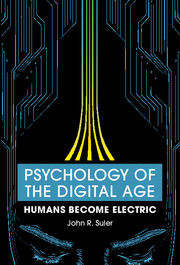Book contents
- Frontmatter
- Dedication
- Contents
- List of Figures
- Foreword
- Preface
- Acknowledgments
- Introduction: Newborns in Evolution
- 1 Cyberpsychology Architecture
- 2 Presence: Be Here Now
- 3 The Dynamic Digital Psyche
- 4 The Disinhibited Self
- 5 Electrified Relationships
- 6 Other Than You Think: Interpersonal Perceptions
- 7 Text Talk
- 8 Image Talk
- 9 I, Avatar
- 10 One of Us: Groups and Communities
- 11 Change and Excess
- 12 Addicted or Devoted
- 13 The Digital Deviant
- 14 Synthesized Realities and Synthesized Beings
- 15 Electric Th erapeutics
- Conclusion: Research and the Researcher
- References
- Index
5 - Electrified Relationships
Published online by Cambridge University Press: 05 November 2015
- Frontmatter
- Dedication
- Contents
- List of Figures
- Foreword
- Preface
- Acknowledgments
- Introduction: Newborns in Evolution
- 1 Cyberpsychology Architecture
- 2 Presence: Be Here Now
- 3 The Dynamic Digital Psyche
- 4 The Disinhibited Self
- 5 Electrified Relationships
- 6 Other Than You Think: Interpersonal Perceptions
- 7 Text Talk
- 8 Image Talk
- 9 I, Avatar
- 10 One of Us: Groups and Communities
- 11 Change and Excess
- 12 Addicted or Devoted
- 13 The Digital Deviant
- 14 Synthesized Realities and Synthesized Beings
- 15 Electric Th erapeutics
- Conclusion: Research and the Researcher
- References
- Index
Summary
When I got my first television set, I stopped caring so much about having close relationships.
– Andy WarholOn two separate occasions I got into a rather intense debate with experienced onliners who claimed that text relationships via email and chat were as powerful, if not more so, than those experienced in person. Both onliners talked about how they could more deeply express their true selves via text, how the merging of their minds with their cyberspace companions far exceeded anything possible in the real world, how one's physical appearance was not only irrelevant but an annoying distraction. I said that I understood their point of view, but also pointed out the important qualities of in-person relating, such as seeing and hearing people, and how we need physical contact, such as hugs and kisses. They staunchly objected, claiming these things were both primitive and superficial. Finally, I said to each of them, “If you had to choose between spending the rest of your life only in person interacting face to face, or only online interacting via text, which would you choose?” One of them fell silent at my question. The other said, “I'd stay online.”
SKEPTICS BEWARE
When cyberpsychology first ascended as a new discipline, skeptics paid little attention simply because they viewed online relationships as superficial encounters at best, most probably a faddish illusion, possibly even a symptom of psychological deficiencies. If people like being with each other inside wires and circuits, there must be something wrong with them. They must fear the genuine intimacy of true human encounters. When cyberspace unrelentingly claimed its territory as a brand new sphere for human interactions – most notably when the term “social media” slipped into the repertoire of household words without a fuss – those skeptical attitudes began to fade out.
But not completely. Theorists, researchers, and everyday people alike continue to debate the pros and cons of online versus offline living, as we all well should. Although everyone would admit that cyberspace gives us some very captivating vehicles for socializing, everyone would also agree that being face to face in the real world, in our physical bodies, is more intrinsically natural.
- Type
- Chapter
- Information
- Psychology of the Digital AgeHumans Become Electric, pp. 112 - 126Publisher: Cambridge University PressPrint publication year: 2015



